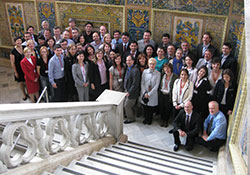WHO Barcelona course on health financing 2011

WHO
Forty-six high-level health professionals from 20 countries attended the first Barcelona Course in Health Financing, held from 2 to 6 May 2011. The course focused on how to improve health system performance through better health financing policies. The course was organized and delivered by the WHO Barcelona Office for Health Systems Strengthening, Division of Health Systems and Public Health.
The participants included high-level policy-makers from the health sector, deputy ministers, government officials in charge of social policy, senior managers of service provider organizations and experts from the European Union (EU) and Global Fund. They came from Andorra, Armenia, Azerbaijan, Bulgaria, Czech Republic, Georgia, Hungary, Kazakhstan, the Netherlands, The former Yugoslav Republic of Macedonia, Republic of Moldova, Mongolia, Montenegro, Poland, Russian Federation, Serbia, Slovenia, Spain, Ukraine and Uzbekistan.
Focus on universal coverage
The special theme of the course this year was universal coverage, reinforcing the messages of the 2010 World Health Report entitled Health System Financing: the Path to Universal Coverage. At the World Health Assembly in 2005, WHO Member States pledged to move towards universal coverage. They renewed and strengthened this commitment in a resolution passed at the Health Assembly in 2011.
The week-long intensive course covered the following issues:
- designing a benefit package – equity, affordability and transparency;
- raising revenues – thinking outside the box;
- pooling health revenues – the cost of fragmentation;
- purchasing – getting more health for the money; and
- coordinating reform – aligning policy instruments with policy objectives.
At the opening ceremony, Dr Boi Ruiz, the Conseller of Health of Catalonia, Spain, welcomed the audience followed by an opening address by Professor Guillem Lopez of Pompeu Fabra University. Professor Alan Maynard from the University of York and Dr Josep Figueras, Director of the European Observatory on Health Systems and Policies also made keynote speeches during the course.
Feedback from participants
Participants said that they found the course very valuable. “I learned a lot,” said Nicolas Cantau, Fund Portfolio Manager-eastern Europe & central Asia, the Global Fund to fight AIDS, Tuberculosis and Malaria. “It was very relevant to me because we engage with the Ministry of Health in terms of health financing reform. Especially now when we are discussing about political issues of health financing reform.”
Mircea Buga, General Director, National Health Insurance Company, Republic of Moldova, commented that the shared experiences and material would prove useful in his country. “The teachers and participants provided good material and experience that could be further implemented in other countries, including in our own country. In Moldova, we have been implementing financing reforms since 2004 and now we are looking forward to taking new mechanisms including pay-for-performance for hospital and primary health care,” he said.
“The high level of the participants exceeded my expectations. I found it very interesting to see the reactions of other countries and how they are implementing health system reform, especially how eastern European countries are working in this field,” said Carme Pallarés, Director, Health Care Department, Ministry of Health, Andorra.
Viorel Soltan, Deputy Minister, Ministry of Health, Republic of Moldova said he would recommend the course to his colleagues. “I think that linking the reform in health financing with the recent crisis was very interesting: how we can use the crisis for our benefit to further promote health reforms”.
Andrea Anna Milkowski, Health Policy Officer in the Directorate-General for EuropeAid Development and Cooperation of the European Commission, added that the course had “been an eye opener. The information was always connected to very practical experiences. The teaching method was superb, connected to very well chosen and very well sequenced content.”



